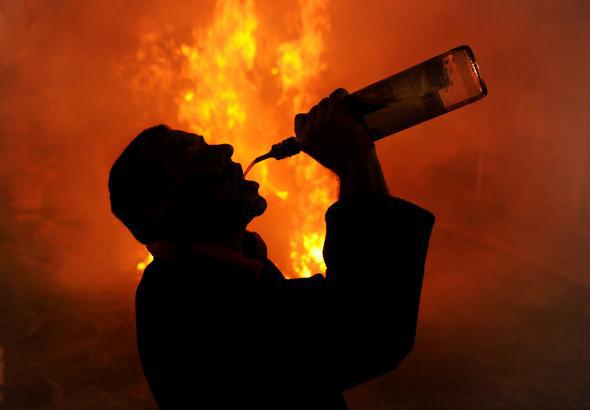This is one in an occasional series of posts about Drynuary, the practice of not drinking alcohol in January.
When we started doing Drynuary nine years ago, my wife and I didn’t know anyone else who took the entire month of January off of booze like we did. As recently as five years ago, the word Drynuary didn’t exist outside of my household (you’re welcome, and sorry?). Today, we know that there are participants around the world, including Anne Hathaway and Kathie Lee and Hoda.
As Drynuary’s popularity and visibility have grown, one of the most fascinating byproducts is the emergence of Drynuary detractors—people who go out of their way to rail against Drynuary and its participants. My doing Drynuary affects no one other than me, my family, and the proprietor of my local wine shop. Yet I’ve aroused in some people the need to drop whatever they were doing and cast aspersions on me and everyone else who takes a break from drinking in the first month of the year. They write comments, publish thinkpieces, and troll the #Drynuary hashtag on Twitter, looking for opportunities to call participants names. They probably heckle marathon runners, too.
I’ve come to think of Drynuary detractors as coming in several distinct types. First and foremost is The Scold, who doesn’t participate in Drynuary—and goes to great lengths to broadcast that fact—yet thinks its proponents are the ones who are annoying and smug. How dare I impose my abstinence on them? The Scold seeks attention by claiming that Drynuary participants are craven attention-seekers; trades in old wives’ tales about binging in February and outdated information from dubious sources; and is unwilling to accept professional opinion, first-person accounts, or new data on the subject. In this way, the Scold is a lot like a climate change denier.
Similar to the Scold but distinct in his focus is The Armchair MD, who insists that Drynuary participants are nothing but unrepentant, untreated alcoholics, yet doesn’t have credentials or science to back up his claims. Armchair MDs may have had legitimate brushes with substance abuse, or know someone who has, and they in turn project that onto Internet strangers. Like Scolds, they make condescending pronouncements about how I wouldn’t need to do Drynuary if I could just practice moderation year-round, unable or unwilling to make the logical leap that Drynuary and moderation aren’t mutually exclusive.
On the opposite end of the spectrum is the type I’ll call The Pusher, who could never do Drynuary himself and contends that Drynuary is just no fun and is therefore pointless. To him, Drynuary participants are joyless prudes. The Pusher insists that January is a dark, cold, boring month, and therefore that alcohol is required to cope (the Armchair MD might like a word here). Meanwhile, The Pro—who might be a bartender, a liquor store owner, or a wine writer—tries to insert herself into the conversation in hopes of spurring business. (Ironically, I’d probably be a fan of these guys 11 months a year if not for their blatant anti-Drynuary pandering.)
Finally—unsurprisingly—there’s the type I’ll call The TL;DR who cannot be bothered to read a few hundred words about Drynuary and therefore completely misunderstands the concept. (For instance, someone who believes that you can participate in Drynuary while still drinking wine would qualify as a TL;DR.)
In a way, the attitudes of these five types of Drynuary detractors reinforce our puritanical, binary, and antiquated views on alcohol and substance abuse. You’re either an alcoholic or you’re not, there is no middle ground, and anything other than complete abstinence is failure. Of course the Scold and the Armchair MD think that you must be binging when you’re not abstaining during Drynuary (but they won’t concede that even binge drinkers could benefit from Drynuary, if only because then they’d be binging for 11 months a year and not 12). These detractors cannot reconcile Drynuary with year-round moderation, in spite of the fact that they are quite complementary concepts. To them, life is true/false, not multiple choice.
I don’t think of myself as a Drynuary evangelist. I write about the benefits I’ve experienced in the hopes of connecting with other participants as the month progresses. I enjoy sharing stories with other Drynuary adherents in a misery-loves-company sort of way, and hope that my experiences over nine years can help those who may be embarking on their first Drynuary. I’m not out to recruit or convert. Make no mistake: I don’t care if you don’t do Drynuary, and I don’t judge you based on whether you do or not. This—in addition to not drinking during January—is what sets me apart from the Drynuary haters. But I look forward to seeing them again in 11 months when I start on my tenth Drynuary.
Previously:
Slate’s Cocktail Columnist Offers Mocktail Recipes for All the Poor Schmoes Doing Drynuary
People Shouldn’t Ask Why I’m Not Drinking—but They Do. Here’s How I Respond.
Why I’ve Given Up Alcohol Every January for the Last Eight Years
What a Psychologist Specializing in Addiction Treatment Thinks About Drynuary
Actually, Not Drinking in January Is a Great Idea
